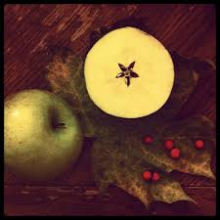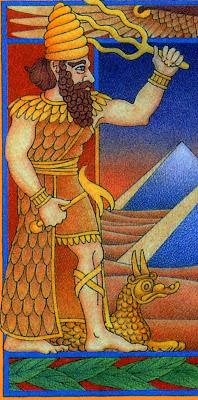Sexuality
Apple Symbolism and Lore
 The apple, that infamous fruit said to have been given by Eve to Adam, is a symbol of sexual awakening, and has deep associations with magick.
The apple, that infamous fruit said to have been given by Eve to Adam, is a symbol of sexual awakening, and has deep associations with magick.
If an apple is cut in half across its “equator” then the pattern of the seeds is revealed, a perfect five-pointed star or pentagram. The repercussions of this hidden magickal symbol are far-reaching. Five, comprised of the feminine number 2 and the masculine number 3, is the number of harmony, of the union of opposites (for example in sexual congress), and of marriage. It is also the number of humankind because of the five points of extremity of the human body.
When Eve gave Adam the Apple of knowledge in the Garden of Eden, therefore, it was not just a piece of fruit she was offering him, but a potent symbol of wisdom. Eating the fruit that contains the pentagram resulted in a profound awakening for Adam and Eve. They became not only aware of their own sexual natures, but they realized that they could make their own choices.
Here the pentagram stands for the spiritual nature of man, and eating it awakens Adam to new possibilities; the flesh combines with the spirit, and immediately Adam and Eve cover their genitals, signifying sexual awakening.
Note: The Bible does not actually identify the fruit eaten by Adam and Eve. Eve took “the fruit of the tree which is in the midst of the garden” ~Genesis 3:3. This fruit is more likely to have been a fig than an apple, as Adam and Eve both covered themselves with fig leaves after tasting the fruit.
In Gypsy wedding ceremonies it is customary to cut the apple in the way described above, the bride and groom each eating half of the fruit.
According to Greek legend, Dionysus, the god of the fertility of nature, created the apple as a gift for Aphrodite, the goddess of beauty. This is the opposite of the Bible story, as in this case the man gave the apple to a woman.
When Zeus and Hera got married, Gaia, Mother Earth, gave the bride golden apples to symbolize fertility. These apples of fertility later became Hercules’ eleventh labor, when he had to steal them and bring them back home. These apples provided immortality to anyone who tasted them.
These stories and others, gave the apple its erotic connotations. Consequently, it’s not surprising that Christians considered the apple tree a tree of sin. The phrase “apple of one’s eye,” which indicates a favorite, well-loved person, may have come from this.
The 19th century proverb, “An apple a day keeps the doctor away,” may have had its beginnings in Norse legend, because the gods retained their vitality and health by eating apples from the gardens of Asgard.
In mythology and folklore, apples have power in addition to taste:
- a means to immortality
- an emblem of fruitfulness
- an offering
- a distraction in suitor contests
- a means of divination
- a test of chastity
- a love charm
- a magic object
- a cure
Magickal apples that confer immortality can be plucked from mythological trees all over the world, In Scandinavian stories, perpetual youth apples were kept by Idun in Asgard, and guarded by the Goddess. Their purpose was to keep the Gods youthful until the end of the Universe.
The Hesperides, in Greek myth, were nymphs that tend a beautiful garden in which grows an apple tree (or trees) whose golden fruit also confer immortality. These apples were understandably highly sought after.
An apple tossed to Conie, son of Conn, by the woman from the Land of the Living provided sustenance to him for a month, but made him long for her and her land, as was her plan.
Gna, messenger of the Scandinavian Frigga, dropped an apple to King Rerir who ate it with his wife, who then bore a child. Frey sent eleven golden apples to Gerda as a marriage offer.
The Greek goddess Atalanta was won by a suitor who threw down golden apples to distract her from their race, which he then won.
In Latin, the word for apple, malam also means “evil,” and reflects the paradox of the apple as a symbol of both good and evil. Although in the Tales of the Arabian Nights, the apple of Prince Ahmed cures all ills, in the fairy tale, Snow White and the Seven Dwarves, the heroine is poisoned by a shiny red apple, and falls into the sleep of oblivion.
The Apple of Discord, inscribed For the Fairest, was given by Paris to Aphrodite, causing a quarrel among the goddesses and helping to bring about the Trojan War.
Collected from various sources
Sirsir
From the Fifty Names of Marduk in the Necronomicon Spellbook.
The Twenty-Eighth Name is SIRSIR.
The Destroyer of TIAMAT, hated of the Ancient Ones, Master over the Serpent, Foe of KUTULU. A most powerful Lord. His Word is APIRIKUBABADAZUZUKANPA.
A secret application of this Spirit concerns celibacy and the harnessing of the sexual urge for greater magickal power, as is done in some Western and Eastern occult traditions.
Important note:
“The Signs and Powers may be summoned after the Priest has ascended to that step on the Ladder of Lights and gained entrance to that Sacred City. The Signs should be engraved on parchment or sealed in clay and placed upon the altar at the Calling. And in the perfumes should be of cedar, and strong, sweet-smelling resins. And the Calling be to the North.”
More information:
According to Sumerian mythology, Marduk was the God who defeated the Ancient Ones long before the creation of matter as we know it.
 Against him in battle were the fierce TIAMAT, KINGU, and AZAG-THOTH. Once he had destroyed these demons, he created the universe from the flesh of TIAMAT, and humanity from the blood of KINGU mixed with his own breath.
Against him in battle were the fierce TIAMAT, KINGU, and AZAG-THOTH. Once he had destroyed these demons, he created the universe from the flesh of TIAMAT, and humanity from the blood of KINGU mixed with his own breath.
You will come across these names in the description of the Fifty Names, which were titles given to Marduk by the Elder Gods after he had helped them to defeat the Ancient Ones.
Related links:
- Pagan Calendar – Marduk’s Feast Day
- The Powers That Be – Marduk The God
- Widdershins – Marduk Legends and Stories, the original translation of the Enûma Eliš, and the Fifty Names of Marduk as originally given in the ancient tablets.
Hegal
From the Fifty Names of Marduk in the Necronomicon Spellbook.
The Twenty-Seventh Name is HEGAL.
As with ENBILULUGUGAL, a Master of the arts of farming and agriculture. Bestows rich harvests. Possesses the knowledge of the metals of the earth, and of the plough. His Word is BURDISHU.
An accomplished mystic writes to us to say that another ability of this Spirit is in the realm of sexual reproduction in people as well, and asserts that HEGAL, can reveal secrets concerning human sexuality and fertility, linking HEGAL with the Semitic Spirit HAGIEL, a Spirit of the planet Venus.
Important note:
“The Signs and Powers may be summoned after the Priest has ascended to that step on the Ladder of Lights and gained entrance to that Sacred City. The Signs should be engraved on parchment or sealed in clay and placed upon the altar at the Calling. And in the perfumes should be of cedar, and strong, sweet-smelling resins. And the Calling be to the North.”
More information:
According to Sumerian mythology, Marduk was the God who defeated the Ancient Ones long before the creation of matter as we know it.
 Against him in battle were the fierce TIAMAT, KINGU, and AZAG-THOTH. Once he had destroyed these demons, he created the universe from the flesh of TIAMAT, and humanity from the blood of KINGU mixed with his own breath.
Against him in battle were the fierce TIAMAT, KINGU, and AZAG-THOTH. Once he had destroyed these demons, he created the universe from the flesh of TIAMAT, and humanity from the blood of KINGU mixed with his own breath.
You will come across these names in the description of the Fifty Names, which were titles given to Marduk by the Elder Gods after he had helped them to defeat the Ancient Ones.
Related links:
- Pagan Calendar – Marduk’s Feast Day
- The Powers That Be – Marduk The God
- Widdershins – Marduk Legends and Stories, the original translation of the Enûma Eliš, and the Fifty Names of Marduk as originally given in the ancient tablets.





